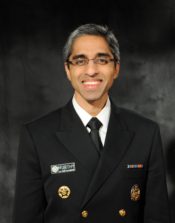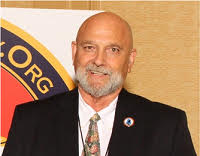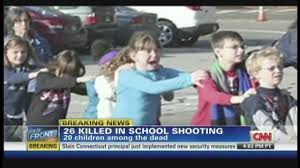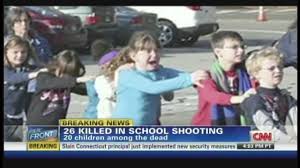Dr. Vivek Murthy was officially confirmed as U.S. surgeon general in December 2014. Exactly two years earlier, Murthy, an outspoken critic of gun violence, had been embroiled in the controversy about the “Newtown massacre,” a shooting spree in a Connecticut town that claimed the lives of 20 schoolchildren and several adults.

Murthy’s high profile on the issue delayed his confirmation, with some senators calling his comments too political. Even before Newtown, the physician’s Tweet that “guns are a health care issue” had created a stir on Capitol Hill.
During the past two years, in his capacity as the nation’s top medical officer, Murthy has continued to speak out about deaths and injuries from firearms.
Political debates over guns have a long history. But Murthy has said his position on guns is not about politics. He looks at the deaths and injuries caused by gunshots as a medical problem, from the perspective of data.
Gun incidents kill more than 30,000 people every year in America, and cause 60,000 injuries.
These shootings are not all criminal acts. Some are accidents, some are suicides, and some involve justifiable shootings of people who were endangering others. But advocates for gun control say much more should be done to keep people from being harmed by firearms, and they believe that reducing the availability of guns can reduce crime and make people safer.
Daniel Webster, director of the Johns Hopkins Center for Gun Policy and Research, said, “Gun violence is very much an urgent public health problem in the United States, claiming about 90 lives every day.”
The total cost of firearm injuries is $235 billion a year, says Ted Miller, health economist at the Pacific Institute for Research and Evaluation.
Blame guns or blame people?
Gun rights advocates also decry violence, but they have a much different perspective on how to deal with it.

Jerry Henry is executive director of GeorgiaCarry.Org, whose members are opposed to any legislation infringing on a citizen’s right to keep and bear arms.
As Henry notes, his concerns include those people who shouldn’t carry a gun. He wants the laws brought to bear on people who commit crimes with guns or use them irresponsibly.
“There’s no such thing as gun violence,” he said. “The violence is in the person. I have a gun sitting near me on the table, it’s not violent at all,” says Henry.
Stopping law-abiding gun-carrying people from exercising their Second Amendment right is not going to change the crime problem in Georgia, he said. “The guns aren’t violent,” he repeated, “it’s just the people.” He said Prohibition didn’t stop alcohol consumption any more than taking guns away from law-abiding citizens would stop gun crimes.
Georgia is considered friendly to gun owners, and recent changes in its law have expanded the right to carry firearms.
State laws governing guns are detailed, specifying when you need a license to carry a weapon, where you can carry your firearms and what the penalties are for breaking the laws. According to Georgia statutes, you may legally store your firearm in your home, motor vehicle or place of business without holding a license.
A medical take on the carnage
According to state figures, 1,392 gun deaths occurred in 2015 in Georgia. (As a comparison, during the same year, 1,432 people were killed on Georgia’s roadways.)
In 2014, Georgia had the 16th-highest number of gun deaths per capita among the states, up four places from 2013, based on data published by Mayors Against Illegal Guns (MAIG).

And Georgia had the 10th-highest rate of “crime-gun exports” among the states in 2009 — meaning that guns sold originally in Georgia were recovered after being used in crimes in other states, according to the MAIG website.
In Atlanta, Grady Memorial Hospital’s emergency department cares for many of the metro area’s shooting victims. Dr. Peter Rhee, Grady Memorial Hospital’s chief of acute care surgery and medical director of the Marcus Trauma Center, said, “I own guns but would like to see more regulation, control and enforcement. I respect the Second Amendment, as it was very important when we . . . used to have muskets. Times have changed.”
“I just got out of the operating room,’’ Rhee said in a GHN interview. “This person [had been] shot four times. We had to open his chest, his sternum, his midline, [plus] I’ve taken him back three times over these last two weeks to surgery.”
“Yes, we do a good job some times of saving their lives, but this is carnage that goes on in the inner city every single night and every single day.”
This past June, the American Medical Association (AMA) voted on a resolution aimed primarily at the congressional ban on CDC research into gun violence.
The AMA reminded physicians and others that there has been virtually no publicly funded research on gun violence for almost 20 years. That’s because Congress has effectively banned the CDC from funding or conducting research on gun violence.
The American Nurses Association states that nurses “regularly witness the trauma that gun violence inflicts on victims, families and communities.” The ANA is also “committed to ending this cycle of preventable violence, death and trauma.”
Memories of a nightmare
The Newtown massacre occurred four years ago Wednesday, on Dec. 14. It was one of America’s most horrifying mass shootings, partly because so many of the victims were small children.

“No other parent should experience the devastating loss of a child, or the primal agony of a child who’s lost a sibling to gun violence,” said Nicole Hockley, whose son, Dylan, was one of the children killed at Sandy Hook Elementary School in Newtown.
A documentary on the shootings, “Newtown,’’ was screened earlier this month by the Arthur M. Blank Family Foundation and other sponsors.
Speaking out against gun violence after the film were members of Georgia’s OutCry, a coalition of clergy members.
On the legislative side, Georgia state Rep. Mary Margaret Oliver (D-Decatur) is proposing that the state prohibit the sale of assault weapons, large-capacity magazines and certain bullets.
According to an August 2016 AJC poll, 48 percent of Georgians are for a ban on the sale of assault weapons, while 47 percent are against it.
Jeff Dickerson, an Atlanta media strategist and weekly panelist on TV’s “The Georgia Gang,” agreed that “the proliferation of guns makes it easier to buy and carry — then everyone is armed.”
In Georgia, said Dickerson (who owns guns himself), “we have the right to carry.” But he added that he would “like to see more limits on guns.”
Judi Kanne, a registered nurse and freelance writer, combines her nursing and journalism backgrounds to write about public health. She lives in Atlanta.

